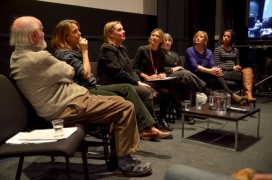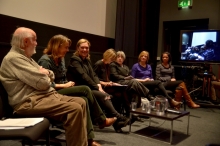An esteemed panel of award-winning filmmakers have taken part in a debate on women in the British film and television industry held at the National Film and Television School (NFTS) as this year’s Colin Young Annual Lecture.
The cross-generational panel, which included drama directors Sarah Gavron and Aisling Walsh, documentary directors Molly Dineen and Alison Millar, and screenwriters Melissa Iqbal and BAFTA Breakthrough Brit Regina Moriarty shared their experience of working in the film and television industry over the past 40 years.
The lively debate, introduced by NFTS founder Colin Young, attended by special guest documentary director/cinematographer Joan Churchill and chaired by the NFTS’ new Head of Screen Studies and former Head of BFI Festivals, Sandra Hebron, reflected on the progress made since the 1970s, as well as the challenges that remain.
Quoting research statistics that highlighted existing patterns of gender imbalance in filmmaking roles in front of and behind the camera, as well as inequalities in pay, Sandra Hebron said: “With gender inquality firmly on the agenda of film festivals and publications this year, here at the NFTS we want to look behind the statistics to explore the experiences of a broad range of women working in film and television.”
Colin Young said a lot had changed since the 1970s when "...some male students took the view that cameras were too heavy for women to handle and froze them out of shooting opportunities." Colin Young called their bluff by inviting his former student from UCLA film school Joan Churchill to run a camera workshop exclusively for women.
The award-winning American cinematographer Joan Churchill, who was the first women to be allowed to join ACT, told the audience: “Coming to England back then was like stepping into the Dark Ages; it was far behind America in terms of women’s roles in filmmaking.”
Aisling Walsh (An Inspector Calls, Fingersmith; Song For A Raggy Boy) said when she was starting out as a director, there had been fewer opportunities for women directors: “A lot of our journey as women directors is about getting into the room to be taken seriously. Very early on people didn’t recognise my name as being female, which I think helped me. My films are often bleak and dark. Now that I’ve established a career it is easier. I’ve just finished filming about a woman painter who struggles to belong in the world and in the community.”
Documentary director Molly Dineen (The Lie of the Land; The Lord’s Tale) observed that her own decision to make films about men rather than women may subconsciously have been to “…avoid being seen as an angry woman and to be taken seriously.” However, Dineen added that women filmmakers with determination can succeed in the industry and needed to avoid viewing themselves as ‘victims.’
Fellow documentary director Alison Millar (The Disappeared; The Shame of the Catholic Church) believed that being a woman working with a small female crew had been an advantage. “Not being taken seriously by men meant that we had greater access to film people and places that might have been out of bounds to male filmmakers.”
Recent NFTS graduate Melissa Iqbal whose Sci Fi genre screenplay The Death Engine won an AMPAS Nicholl Fellowship (2014) said she didn’t feel she had experienced discrimination, “…maybe because there is a new female perspective in the science fiction genre that I write. I’m meeting a lot of people in the industry – other women who want to make something different.”
However, it was acknowledged that those some women lack self-confidence, and may hold back from putting themselves forward for projects. It was agreed that interventions from assertive training to mentoring by successful role models could be beneficial for many aspiring women filmmakers. Recent NFTS graduate Regina Moriarty (who wrote the screenplay for the BBC3 award-winning drama Murdered By My Boyfriend) felt that individual filmmakers could make subtle but important changes to the number and type of women’s acting roles.
Citing a forthcoming TV crime drama which she’d been brought in to develop, ReginaMoriarty said that the plot had focussed on a male lead, whilst the female murder victim was barely mentioned. When she’d challenged this and asked if she could develop the woman’s character, the director was happy for the story to be refocused. “I just felt that the central male character would make more sense if the audience understood more about the female victim,” said Moriarty. “Once I’d developed her then the whole story came together.”
Suffragette and Brick Lane director Sarah Gavron (speaking via a satellite link from Los Angeles) said education was key to progress and more women should be given the opportunity to go to film schools like the NFTS because, “…the school is a place where you can learn and make mistakes, I wouldn’t have made films if I hadn’t gone to the NFTS because it gave me room to try things out and prepared me to work in the industry.”
The panel agreed and praised the NFTS for offering, “a safe space in which to experiment, learn their craft and develop their voice,” alongside male filmmakers. Aisling Walsh added: “Film school gives you that support to figure out what your voice is and what kind of films you wanted to make. You also get to meet talented people. Still to this day I’m working with a DoP who is an NFTS graduate. There is a connection as filmmakers trying to give a voice to something we are passionate about doing and that’s the incredible thing that comes from the school.”
In addition to positive educational initiatives such as FILMCLUB founded by NFTS graduate Baroness Kidron, IntoFilm and the BFI’s Film Academy Craft Residential that the NFTS runs for 16-19 year future filmmakers, the panel called for early educational initiatives to encourage more school children, especially girls, to see filmmaking as a viable career option.
For more information about the BFI Film Academy 2016 go to: https://nfts.co.uk/bfi-film-academy
We are still accepting places on our Film Studies Programming and Curation two-year Masters course, which starts in January 2016 and is led by Sandra Hebron and delivered in partnership with the British Film Institute (BFI).
Find out more about this course here

